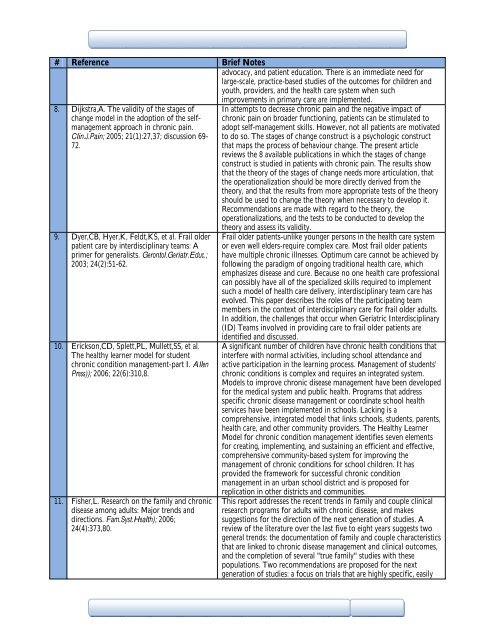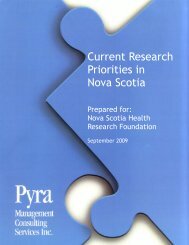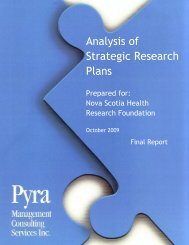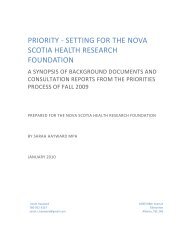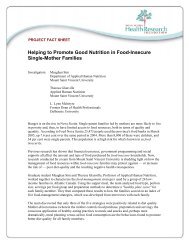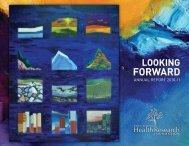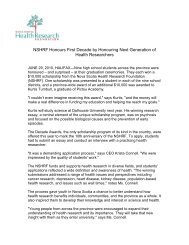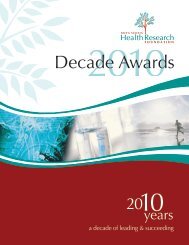Major Health Issues in Nova Scotia: An Environmental Scan
Major Health Issues in Nova Scotia: An Environmental Scan
Major Health Issues in Nova Scotia: An Environmental Scan
You also want an ePaper? Increase the reach of your titles
YUMPU automatically turns print PDFs into web optimized ePapers that Google loves.
# Reference Brief Notes<br />
advocacy, and patient education. There is an immediate need for<br />
large-scale, practice-based studies of the outcomes for children and<br />
youth, providers, and the health care system when such<br />
improvements <strong>in</strong> primary care are implemented.<br />
8. Dijkstra,A. The validity of the stages of<br />
change model <strong>in</strong> the adoption of the selfmanagement<br />
approach <strong>in</strong> chronic pa<strong>in</strong>.<br />
Cl<strong>in</strong>.J.Pa<strong>in</strong>; 2005; 21(1):27,37; discussion 69-<br />
72.<br />
9. Dyer,CB, Hyer,K, Feldt,KS, et al. Frail older<br />
patient care by <strong>in</strong>terdiscipl<strong>in</strong>ary teams: A<br />
primer for generalists. Gerontol.Geriatr.Educ.;<br />
2003; 24(2):51-62.<br />
10. Erickson,CD, Splett,PL, Mullett,SS, et al.<br />
The healthy learner model for student<br />
chronic condition management-part I. Allen<br />
Press)); 2006; 22(6):310,8.<br />
11. Fisher,L. Research on the family and chronic<br />
disease among adults: <strong>Major</strong> trends and<br />
directions. Fam.Syst.<strong>Health</strong>); 2006;<br />
24(4):373,80.<br />
In attempts to decrease chronic pa<strong>in</strong> and the negative impact of<br />
chronic pa<strong>in</strong> on broader function<strong>in</strong>g, patients can be stimulated to<br />
adopt self-management skills. However, not all patients are motivated<br />
to do so. The stages of change construct is a psychologic construct<br />
that maps the process of behaviour change. The present article<br />
reviews the 8 available publications <strong>in</strong> which the stages of change<br />
construct is studied <strong>in</strong> patients with chronic pa<strong>in</strong>. The results show<br />
that the theory of the stages of change needs more articulation, that<br />
the operationalization should be more directly derived from the<br />
theory, and that the results from more appropriate tests of the theory<br />
should be used to change the theory when necessary to develop it.<br />
Recommendations are made with regard to the theory, the<br />
operationalizations, and the tests to be conducted to develop the<br />
theory and assess its validity.<br />
Frail older patients-unlike younger persons <strong>in</strong> the health care system<br />
or even well elders-require complex care. Most frail older patients<br />
have multiple chronic illnesses. Optimum care cannot be achieved by<br />
follow<strong>in</strong>g the paradigm of ongo<strong>in</strong>g traditional health care, which<br />
emphasizes disease and cure. Because no one health care professional<br />
can possibly have all of the specialized skills required to implement<br />
such a model of health care delivery, <strong>in</strong>terdiscipl<strong>in</strong>ary team care has<br />
evolved. This paper describes the roles of the participat<strong>in</strong>g team<br />
members <strong>in</strong> the context of <strong>in</strong>terdiscipl<strong>in</strong>ary care for frail older adults.<br />
In addition, the challenges that occur when Geriatric Interdiscipl<strong>in</strong>ary<br />
(ID) Teams <strong>in</strong>volved <strong>in</strong> provid<strong>in</strong>g care to frail older patients are<br />
identified and discussed.<br />
A significant number of children have chronic health conditions that<br />
<strong>in</strong>terfere with normal activities, <strong>in</strong>clud<strong>in</strong>g school attendance and<br />
active participation <strong>in</strong> the learn<strong>in</strong>g process. Management of students'<br />
chronic conditions is complex and requires an <strong>in</strong>tegrated system.<br />
Models to improve chronic disease management have been developed<br />
for the medical system and public health. Programs that address<br />
specific chronic disease management or coord<strong>in</strong>ate school health<br />
services have been implemented <strong>in</strong> schools. Lack<strong>in</strong>g is a<br />
comprehensive, <strong>in</strong>tegrated model that l<strong>in</strong>ks schools, students, parents,<br />
health care, and other community providers. The <strong>Health</strong>y Learner<br />
Model for chronic condition management identifies seven elements<br />
for creat<strong>in</strong>g, implement<strong>in</strong>g, and susta<strong>in</strong><strong>in</strong>g an efficient and effective,<br />
comprehensive community-based system for improv<strong>in</strong>g the<br />
management of chronic conditions for school children. It has<br />
provided the framework for successful chronic condition<br />
management <strong>in</strong> an urban school district and is proposed for<br />
replication <strong>in</strong> other districts and communities.<br />
This report addresses the recent trends <strong>in</strong> family and couple cl<strong>in</strong>ical<br />
research programs for adults with chronic disease, and makes<br />
suggestions for the direction of the next generation of studies. A<br />
review of the literature over the last five to eight years suggests two<br />
general trends: the documentation of family and couple characteristics<br />
that are l<strong>in</strong>ked to chronic disease management and cl<strong>in</strong>ical outcomes,<br />
and the completion of several "true family" studies with these<br />
populations. Two recommendations are proposed for the next<br />
generation of studies: a focus on trials that are highly specific, easily


